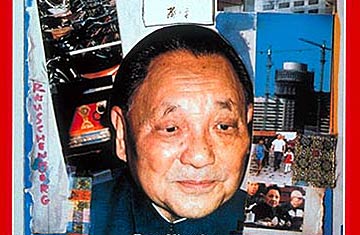
(5 of 17)
The animating spirit of Deng's reforms has been to liberate the productive energies of the individual, a daring concept not just for a Marxist but for a Chinese (the concept of individualism has a negative connotation in Chinese society). He began, appropriately, with agriculture, which had been collectivized by Mao to a degree extreme even for the Communist world. The land was worked by communes that grew what the state directed and turned over all food produced to the state for distribution. Pay was based on a system of "work points" that bore little relation to production: a peasant would accumulate a certain number of work points for planting rice seedlings, for example, but he or she would fare no better if the eventual crop was large than if it was small.
Deng's reforms abolished the communes and replaced them with a contract system. Though the state continues to own all land, it leases plots, mostly to individual families. Rent is paid by delivery of a set quantity of rice, wheat or whatever to the state at a fixed price. But once that obligation is met, families can grow anything else they wish and sell it in free markets for whatever price they can get (though the state does set limits on how much some prices can fluctuate).
Most of the first leases were for two or three years, but they are now being extended, usually for 15 years and as long as 30 years on grazing land. Under a 1985 law the leases can be inherited. Peasants own their draft animals, and those who prosper can buy machinery; ownership of tractors has burgeoned from 90,000 to 290,000 in the past two years. Though the state retains the power to cancel a peasant family's lease and award it to someone else, that power is rarely exercised. Farm families are increasingly regarding the good earth as theirs and using it about the way they would if they owned it outright.
Farmers are allowed, indeed encouraged, to build privately owned houses on their state-owned land. Roads all over rural China have been narrowed by piles of bricks dumped along the shoulders to be picked up by peasants who are erecting homes or even paying others to do it for them. Compared with the days of Mao, when many peasants were required to live in dormitories and eat in communal mess halls, the change in life-style alone is almost revolutionary.
The results have been phenomenal. Freed to prosper by hard work, Chinese farmers have increased food production around 8% in each year since 1978, about 2½ times the rate in the preceding 26 years. Variety has increased along with quantity; besides rice and wheat, the Chinese are growing and eating more poultry and pork (China has the world's largest pig population, though many are scrawny beasts quite unlike the corn-fattened hogs of Iowa or Nebraska). The biggest payoff of all: Vaclav Smil, a Canadian geographer, calculates that in China, "today's diets appear to supply, on the average, enough energy and protein for normal growth and healthy life." In a country that has been racked by periodic famines throughout four millenniums of recorded history, the average citizen has, finally, enough to eat.
